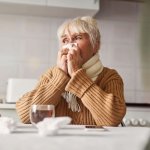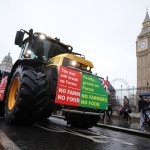woman who had to say a final goodbye to her father through a window as he died of coronavirus in a care home has shared their story as the Covid-19 Inquiry got underway on Tuesday.
The long-awaited probe into the UK’s handling of the pandemic began in west London with a video featuring people from across the UK who lost loved ones to coronavirus.
They shared tearful accounts of not being allowed to see loved ones while they were dying or to give them a proper funeral, in a montage inquiry chair Baroness Heather Hallett described as “extraordinarily moving’.
One woman cried as she told how her father and 54-year-old sister had died five days apart. Another recalled not being able to choose a burial outfit for her loved one as body bags had to remain sealed, while others said they were unable to hug each other at family funerals due to social distancing rules.
The inquiry – which is set to last years and cost more than £100million – is split into six modules, with public hearings scheduled to conclude by summer 2026, and interim reports published before then.
The first module is expected to last around six weeks, and focus on whether the pandemic was properly planned for and “whether the UK was adequately ready for that eventuality”.
Live updates
Response to Covid should have gone ‘far beyond’ healthcare, says barrister
It should have been “obvious” that pandemic planning should have gone “far beyond” healthcare, a barrister representing bereaved families has told the inquiry.
Pete Weatherby KC, of Covid Bereaved Families for Justice UK, is currently giving his opening statement.
He said the “closest to an overall plan” in 2020 was the Department of Health’s 2011 pandemic flu preparedness plan.
He added: “Was that fit for purpose for a non-flu pandemic in 2020? Why wasn’t there a whole-system plan?
“Wasn’t it obvious that civil emergencies, including pandemics, are by very nature national whole-system emergencies and require national whole-system planning as a result?
“Options for border controls and screening, travel restrictions and quarantine, maintaining food supplies and public security, enforcing emergency restrictions on movement and assembly, maintaining education and social services systems and protecting the economic well-being of the country and jobs are all matters way beyond the remit of the Department of Health and Social Care.”
Make-up of agencies dealing with pandemic was ‘labyrinthine’, inquiry hears
There could be a conclusion drawn that there was a “labyrinthine and confusing picture” when it came to the various health bodies, committees and subcommittees, the UK’s Covid-19 Inquiry has heard.
“Relevant bodies, committees and subcommittees within Government were renamed or sometimes disbanded altogether only for other strikingly similar ones to be set up in the immediate aftermath,” the inquiry’s lead counsel Hugo Keith KC said.
“One might conclude, looking at the schematic schedules, that there was a labyrinthine and confusing picture.
“Was it really necessary?”
Government gave ‘very little thought’ to lockdown impact
The lead counsel at the Covid-19 Inquiry said “very little thought” was given by the Government about the scale of the impact a national lockdown could have.
Hugo Keith KC said: “Extraordinary though it may seem, given that it’s a word that’s forever seared in the nation’s consciousness, there was very little debate pre-pandemic of whether a lockdown might prove to be necessary in the event of a runaway virus, let alone how a lockdown could be avoided.
“Very little thought was given to how, if it proved to be necessary, how something as complex, difficult and damaging as a national lockdown could be put in place at all.
“Equally, there appears to have been a failure to think through the potentially massive impact on education and on the economy in trying to control a runaway virus in this way.”
Mr Keith also questioned whether past experiences could have led to complacency in planning.
He added: “Was there an element of complacency based on our recent experiences, including the ranking in the Global Health Security Index? Or our response to swine flu in 2009 and the UK’s undoubted successes in ensuring Sars and Mers did not spread?
“Did our experience of the 2009 swine flu lead to concerns about overreacting?”
Hugo Keith KC said a question for the inquiry was whether the Government’s system of planning “become self-validating or complacent”.
He added: “To what extent were the likely consequences of either influenza or a new and emerging infectious disease reassessed?
“The evidence may show simply and terribly that not enough people thought to ask because everybody started to assume it would be flu and, if it was flu, diagnostic testing, case detection and isolation are less effective on account of the shorter incubation period.
“And as I’ve said, there will always be antiviral medicines and vaccines and a national pandemic flu service.
“So, to what extent did the United Kingdom Government and the devolved administrations have a strategy for preventing a pandemic from having disastrous effects, as opposed to dealing with the disastrous effects of the pandemic and the reasonable worst case scenario which was assumed to follow?”
WATCH: Families share emotional stories of loss
Warning: This video features moving, detailed accounts of illness and bereavement
Covid Inquiry video of families of victims
UK ‘surprised’ by ‘significant aspects’ of pandemic
The UK was “taken by surprise” when it came to “significant aspects” of the pandemic, the inquiry has heard.
Hugo Keith KC, lead counsel to the UK Covid-19 Inquiry, said: “It had long been assessed by planners that there was a significant risk of a non-influenza pandemic and an even greater risk of a flu pandemic.
“Such risks were assessed and thought about and planned for and prepared for and written about by the department’s bodies, agencies, services, responders and personnel who make up the United Kingdom’s emergency preparedness, resilience and response (EPRR) structures”.
“But fundamentally, in relation to significant aspects of the Covid-19 pandemic, we were taken by surprise.”
‘We might not have been very well prepared at all’ for pandemic, inquiry hears
The UK “might not have been very well prepared at all” for a pandemic, the lead counsel to the inquiry has said.
Hugo Keith KC said that on March 3, 2020, the Department of Health and Social Care, along with the three devolved governments of Scotland, Wales and Northern Ireland, published a Covid-19 Action Plan “setting out how they planned to tackle the coronavirus outbreak”.
He said: “Based on the experience of dealing with other infectious diseases and the influenza pandemic preparedness work that had been carried out, the plan stated that the United Kingdom was well prepared to respond in a way that offered substantial protection to the public.
“Whether that was actually the case will be examined in module one.
“And of course, that is why module one in terms of preparedness, in terms of the response that was expected, that is the focus of your examination.
“And even at this stage before hearing the evidence, it is apparent that we might not have been very well prepared at all.”
UK was ‘not prepared for mass testing’, inquiry told
Hugo Keith QC, lead counsel to the inquiry, says it was clear that the UK had not “adequately foreseen and prepared for mass testing” in the event of a pandemic.
He told the hearing: “The reality was that the United Kingdom Government announced it would stop all community testing for Covid-19 and focus instead on testing people in hospitals and protecting health workers as it moved from the contain phase to the delay phase.
“There was no anti-viral medicine and no national pandemic flu service to prescribe it – for the simple reason that Covid-19 was not an influenza virus.”
WATCH: Bereaved families share their stories of loss
Warning: This video features moving accounts of illness and bereavement
Covid Inquiry video of families of victims
Counsel to the inquiry delivers opening statement
Hugo Keith KC, counsel to the inquiry, has now stood to deliver his opening statement.
He has begun by giving a brief chronology of the Covid-19 pandemic, from when it was first detected in China, to the various steps of the UK’s response.











